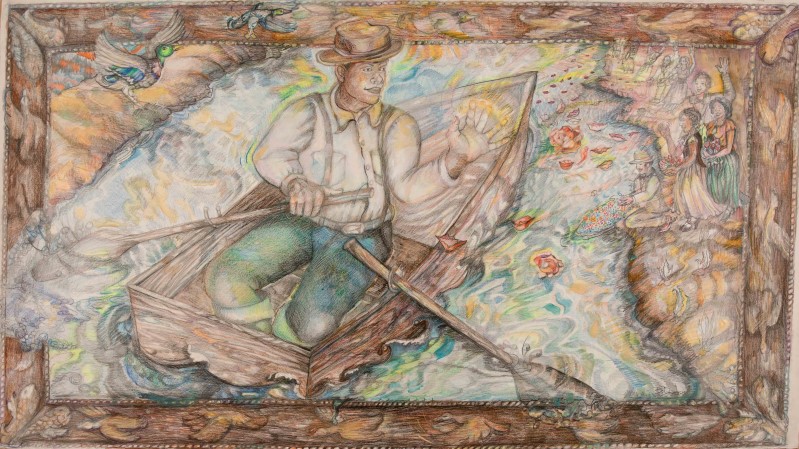
Painting by Bernice Davidson
There Will Never Be Another Will Evans
Premier Fisherman, Boat Builder and Sportsmen’s Guide
by Colleen Farrell
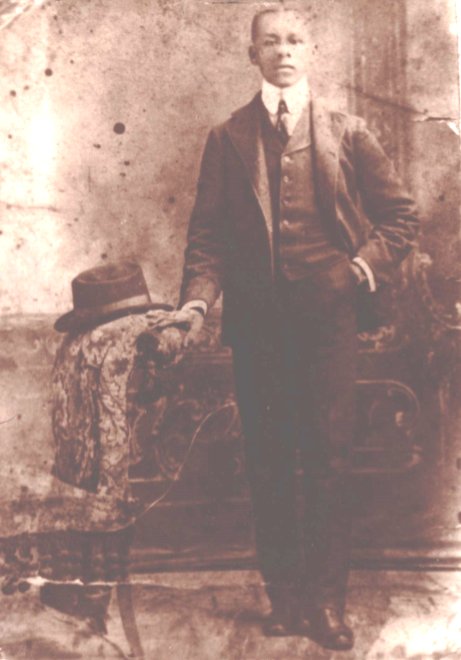
Dec. 31, 1882 – Sep 7, 1945
He “fished and hunted according to a code of ethics …”
“It’s too bad that someone did not write about Will Evans when he was still alive” mused Bill Holder, writer for The Tennessean in 1947.
If Will Evans were alive today a fishing trip with him might be featured on the television show Tennessee Outdoors, or receive mention in the state and national news when his fishing companions were the likes of U.S. President Franklin D. Roosevelt or U.S. Secretary of State Cordell Hull. “He must have been one of the best fishermen that ever lived.”
According to Holder, those who went fishing with Will Evans might have looked for his third arm. His technique was to maneuver a paddle stationed under his left arm, rowing in easy circular motions,
while fishing or hunting with his other hand at the same time. He could paddle his skiff along without a sound and glide a hunter to within a few feet of sitting ducks, at which time he would warn the hunters with a low soft whistle, alerting them to a good shot.
Bill Holder continued: “According to the men who knew him, Will Evans was a quiet person of dignity and character.
He fished and hunted according to a code of ethics, and the men who fished and hunted with him observed this code, too. He never worked a second time for anyone who fished without the proper license or exceeded the bag limit. He preferred to hunt or fish with three men in the boat, including himself. He would take out a boat with four men, but he did not like to do that. Neither did he like to fish with anyone who drank.”
RESERVATIONS NEEDED WEEKS (EVEN MONTHS) IN ADVANCE
Will Evans might well have come by his talent for fishing and hunting naturally as his father, Sidney Miller Evans, was also a fisherman by trade and known as an “Indian Guide.” Newspaper columnist W.D. Hasting
remembered that “I first started hunting duck and fishing on Old Duck River back in the 1890s with Will’s father, Sid Evans, and after Sid passed away, or long before, I had Will . . . that is, if the other hunters and fishermen didn’t already have him. In order to get Will you had to make a date far ahead, so as to be sure he wasn’t grabbed by someone else … I secured a date with Will nearly a month ahead of time, that was how popular he was …”
Back in the days when Will and his customers were young, the weather did not stop a planned outing on the river. “We would go rain or shine, snow, sleet or what have you, and we always got fish if we were fishing, and if hunting, we always got ducks, and most always got the limit, when it was permissible to take 20 per day. Will would kill just as many ducks, if not more than, the party he was pushing, and the same was also the case in fishing.
He would paddle the boat with one hand and fish with the other, and seldom did he lose a strike. When a bass bit his minnow, it was almost a certainty that fish would soon find himself on the fish string.”
KNOWN TO SPORTSMEN IN EVERY TOWN IN MIDDLE TENNESSEE
Will Evans began making his own living at the age of fourteen. He wrapped fishing poles, made his own nets and took men on the river fishing. Will’s clientele included both white and African American men, anyone with the means to pay for his services. His granddaughter Sandra Seaton remembers hearing about him taking doctors from Meharry Medical College fishing as well as African Americans from Middle Tennessee communities.
By the time of his death Will Evans was known to river men up-and-down the Tennessee River and to sportsmen in every town in middle Tennessee. They would begin calling him in February to book fishing dates in the spring and summer. Will did not use calendars or write down appointments but kept track of his busy schedule in his head. Even so, he never missed an appointment.
In the occupation of sportsman’s guide, Will made a good living of $5.00 per day, and he fished six days a week. On Saturdays he caught minnows. When taking a group out on the river, he provided the poles and bait, and they provided food and nonalcoholic beverages. Will baited all the hooks and removed all the fish as well as propelling and guiding the boat through the water. His granddaughter remembered that he set the rules and, as a part of his professional code, preferred not to take out anyone who was late, swore or smoked cigarettes.
Will’s knowledge about game was greater than any other man in this part of the country. “He knew the habits of fish, where they could be found and what bait they would be likely to take. He had the best ‘eye’ in Middle Tennessee: he could see ducks and squirrels where no one else could, and spot them almost a hundred yards away.”
This photo was sent to Emma Evans with a condolence letter from Charles W. Kelly, Pastor at Tuskegee Institute, Alabama.
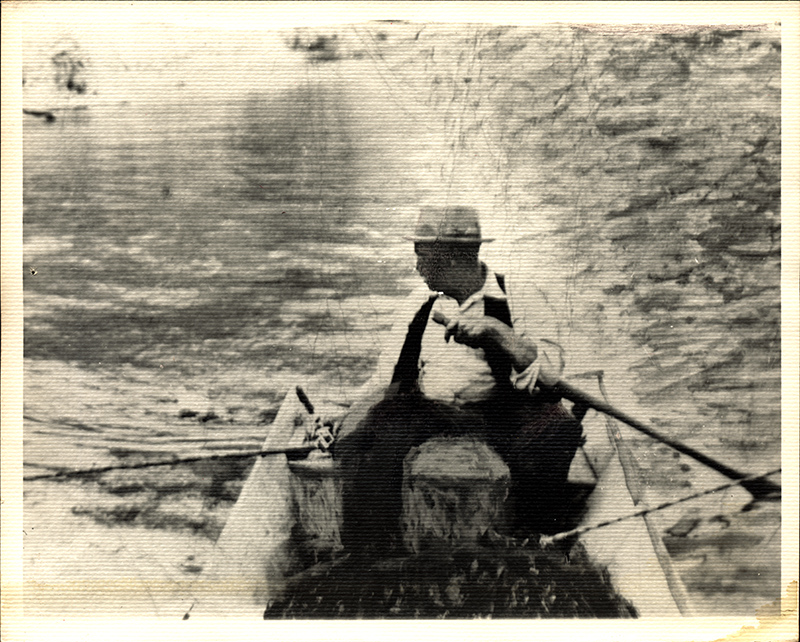
BOAT MAKER
An additional talent of Will Evans was designing and crafting boats. People said his boats “had a little flair”8 that others could not duplicate. Many people in the Columbia area said they could spot one of Will Evans’s boats on the river as far as the eye could see, because there was “something about their lines th at nobody can seem to duplicate.”
ON THE RIVER WITH FRIENDS
According to his granddaughter, “Grandpa Will” and Will Ridley had developed genuine friendship and often spent time together.
On September 7, 1945, the two Wills went fishing at Pickwick Dam with Major Horace Frierson (who was the U.S. Attorney for the Middle District of Tennessee at that time). During this successful bass fishing trip Will Evans experienced what he thought to be colic. After taking some paregoric syrup he felt better. When the three men arrived back at Will Ridley’s home (Clifton Place), “Grandpa Will” went around to the back of the car to get the buckets out of the trunk. Instead, he pitched forward on his face suffering a massive heart attack and died suddenly at age 62.
WILLIAM P. RIDLEY
Friend of Will Evans and owner of Clifton Place (the home originally built for Gen. Gideon Pillow.) The three men arrived back at Clifton Place, where Will Evans unexpectedly died of a massive heart attack.
MANY MOURNED HIS LOSS
The sudden death of Will Evans on September 7, 1945, shocked and saddened sportsmen throughout Middle Tennessee. Writing about this in hindsight almost two years later, the following account was published in The Tennessean Magazine on June 22, 1947:
There were almost as many white people at his funeral as colored … White men were glad to serve as honorary pallbearers for Will.
The move to mark Will’s grave got underway soon after his death. “We just couldn’t bear to think of Will lying out there without anything over his head,” a Columbia fisherman said.
Contributions came from Nashville, Murfreesboro, all around. The seven-and-a-half-foot stone which was finally raised over his grave was embossed with a cross and engraved with the words: “Erected by Sportsmen” and, under that, “In the Shadow of the Cross May They Find Peace.” Below that is the name, William H. Evans 1882-1945.
MAJOR HORACE FRIERSON
After Admiral William Banks Caperton of Spring Hill, Tennessee, Horace was the next highest-ranking Maury Countian in World War I. He became the first commander of American Legion Post 19 in Columbia, Tennessee.
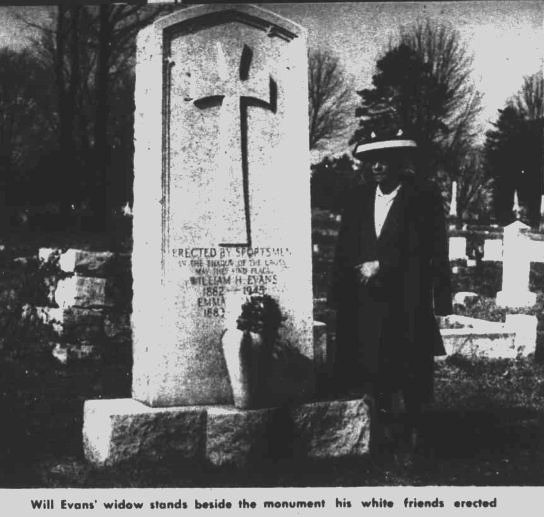
BAD NEWS ECLIPSED THE GOOD
In February 1946, six months after Will Evans died, Columbia became known nationwide as the site of a “race riot” that caused great damage to the African American business district. While these events were unfolding before the nation in widespread press coverage, the Sportsmen of Middle Tennessee were continuing their efforts to honor Will Evans with a memorial stone. It was dedicated at Rosemount Cemetery in the spring of 1946.
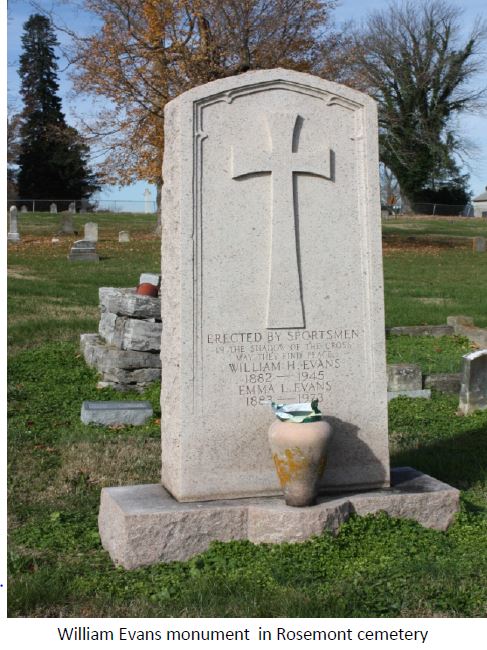
Spearheaded by Will Evans’s granddaughter, Sandra Seaton, and with the help of several other family members, the newspaper articles, photos and other information were brought together in tribute to her beloved “Grandpa Will” and compiled into this article written by Coleen Farrell.
